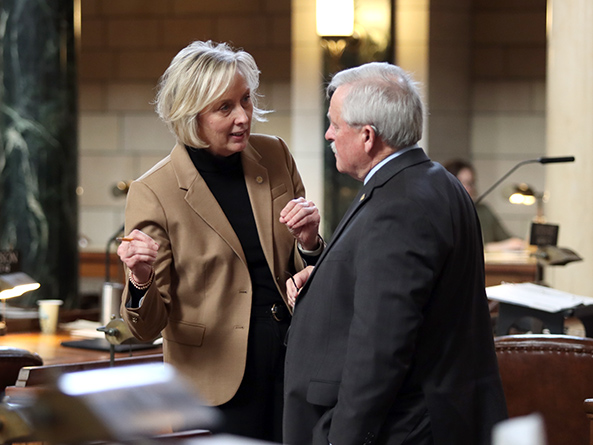Free school meal opt-in requirement advanced
Lawmakers gave first-round approval Feb. 6 to a bill intended to maximize participation in a federal program that allows school districts with high poverty rates to serve free breakfast and lunch to all of their students.

LB285, as introduced by Fremont Sen. Lynne Walz, would require public schools that serve a certain percentage of students in poverty to opt in to the reimbursement program, called the community eligibility provision.
Walz said eligible Nebraska schools have been slow to opt in to CEP out of concern that the program is too burdensome to administer or that it could affect a district’s state aid.
Under the bill, the state Department of Education could waive the requirement if a district shows that participation in CEP is not “financially viable.” The department would provide technical assistance to those schools to help them adopt CEP in the future.
Walz, a former teacher, said research shows that childhood hunger can derail proper development, leaving lifelong deficits in cognitive skills, physical and mental health and behavioral and academic performance.
“I saw many kids coming into the classroom who hadn’t had anything to eat,” she said. “And I can tell you [that] it affected their ability to concentrate and learn in school.”
Walz offered an amendment, adopted 41-0, that would expand the measure to include private schools. The change was requested by the Nebraska Catholic Conference, she said, as a result of private schools gaining a better understanding of the benefits of CEP.
Elkhorn Sen. Lou Ann Linehan supported the proposal, but said she wanted to “throw a caution flag” during the first round of debate regarding any potential impact LB285 might have on determining a school’s need under the state’s funding formula. She said the bill’s fiscal note was ambiguous on that point.
Sen. R. Brad von Gillern expressed similar concerns. He said recent action taken by Omaha Public Schools resulted in every student in the district being classified as “impoverished,” which likely will impact the amount of equalization aid flowing to the district in the future.
“I am not in any way, shape or form a fan of free and reduced lunch for families who can afford to pay for their own meals,” von Gillern said. “That’s just a misappropriation of state and federal funds.”
Following adoption of the Walz amendment, senators voted 33-10 to advance the bill to select file.


